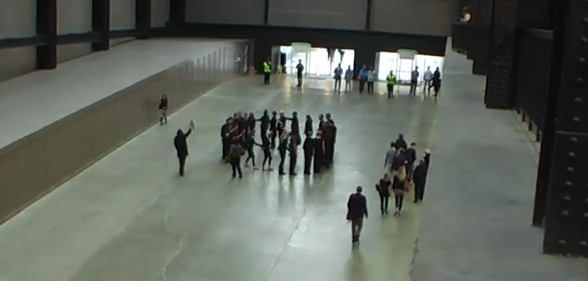El Martes 14 de septiembre los activistas de Liberate Tate llevaron a cabo una intervención en la Tate Modern, cubriendo el piso de la emblemática Turbine Hall con decenas de litros de pintura al óleo en protesta por el patrocinio de la Tate a la BP.
La acción tuvo lugar un día antes de un encuentro de la Junta Directiva de la Tate. Liberate Tate hace parte de un creciente movimiento público que solicita a la Tate poner fin a su relación con la petrolera. La Junta Directiva de la Tate ha decidido revisar el acuerdo de patrocinio con la BP.
A las 5 pm, alrededor de 50 figuras vestidas de negro entraron en la galería de cada uno con un tubo de oleo con el logo de la BP. En un círculo se colocan los tubos de pintura en el suelo y cada uno de los miembros del grupo va vaciando su contenido, expulsando decenas de litros de pintura sobre el piso. El resultado de esta acción, titulada«Crudo», se ofreció a la Tate para formar parte de su colección.
***
Blake Williams, a participant in the performance, said: «Ten years ago tobacco companies were seen as respectable partners for public institutions. The Gulf of Mexico oil spill has brought home to an even wider public that the impact of big oil companies like BP on the environment and the global climate makes them equally unethical for an art museum, especially one that purports to demonstrate leadership in response to climate change.»
Tate’s latest annual report (2009/10), released this month, claims «sustainability is a prime consideration throughout Tate’s work». Tate reduced its energy use and overall carbon emissions last year and makes much of its partnership with the Carbon Trust and that it was a founding signatory to the national 10:10 campaign, launched at Tate Modern, aiming to reduce carbon emissions by 10% in 2010.
Liberate Tate said: «Tate has so far chosen to take a very narrow view of its footprint in relation to climate change and to not yet take into account its formal relationship with Big Oil. At a time when arts institutions wish to demonstrate how central the arts are in bringing social benefits to all and thus deserving of strong public funding, the museum must accept responsibility for its full impact in society.»
«Tate has a sponsor in BP that is engaged in socially and ecologically destructive activities. This is incompatible with Tate’s ethical guidelines, its stated vision in regard to sustainability and climate change, and for maintaining Tate’s reputation. In addition, its mission is undermined if visitors to Tate galleries cannot enjoy great art without the museum making them complicit in creating climate chaos. We call on the governing body to recognise this and end Tate’s relationship with BP.»
Earlier this year Liberate Tate issued an open invitation for artists, art lovers and other concerned members of the public to act to ensure that Tate ends its oil sponsorship by the end of 2011 ahead of Tate Modern’s expansion into its cleaned out underground oil tanks.
«You don’t abandon your friends because they have a temporary difficulty.»
– Nicholas Serota, Tate Director
An oil spill is one thing. Destruction of entire ecosystems, massive human rights abuses and millions of deaths from climate change is another thing altogether. BP’s ‘difficulty’ is not temporary; it is fundamental. BP is a climate criminal – pushing our civilisation to the brink of destruction in pursuit of profit. Climate Change kills hundreds of thousands of people a year and will kill many more unless we act immediately and radically to stop it.
BP and the Tate should not be friends. It is long past time for the Tate to abandon BP and renounce its complicity in their crimes.
Liberate Tate
http://www.artnotoil.org.uk/
